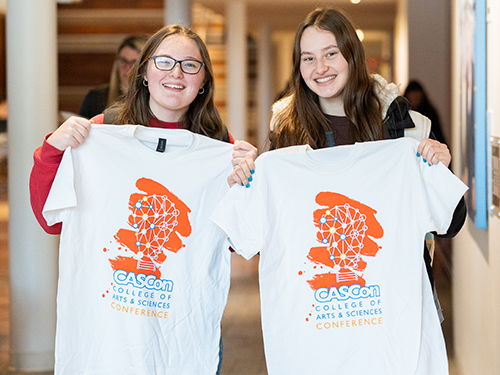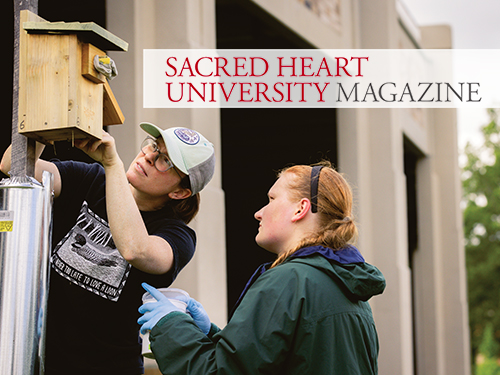
Minor in Neuroscience
Blizzard: February 24, 2026
Classes before noon on Tuesday, February 24 will remain remote. Review our website for detailed instruction.
Why Earn Your Minor in Neuroscience at Sacred Heart?
The neuroscience minor emphasizes interdisciplinary coursework in biology and psychology, focusing on the integration of these fields. With this minor, you’ll prepare for graduate and professional training in the biomedical sciences, careers in the health professions or careers in neuroscience-related biotechnology and pharmaceutical industries.
Program Requirements
Students in the neuroscience minor are required to take 15 credits (5 courses), including two neuroscience major foundation courses and a minimum of three additional neuroscience courses (with a minimum of 1 taken from each department).
Required Courses
Choose BI 205 or PS 350
This course is an introduction to neuroscience, a discipline in which the biological and psychological sciences are integrated. This broad overview addresses topics ranging from the cellular physiology of neurons to issues of human language, cognition, and mental illness. A prerequisite to BI 305.
Prerequisite: Take BI 111, 112 and PS 110
Introduces students to the field of neuroscience, which combines biology and psychology into a single area of study. Topics range from the cellular and molecular physiology of neurons to issues of human language, cognition, mental illness, and drug use.
Prerequisite: Take PS 110 or BI 111
This course introduces students to the nervous system and the principles by which it is organized, processes information, and produces complex behaviors and cognitive processes. Beginning with the neurophysiology of neurons, this course proceeds through synaptic transmission, neuropharmacology, hormonal regulation of behavior, the neural basis of sensory perception, biological rhythms/sleep, theories of emotion, learning and memory and consciousness.
Prerequisite: Take PS-110 or BI-111
Electives
Choose three electives below. Must choose at least one BI elective and one PS elective.
Lecture involves the investigation of endocrine, cardiovascular, lymphatic, respiratory, digestive, urinary, and reproductive systems. This section is for students interested in athletic training, exercise science, physical therapy, occupational therapy, human movement, or physician assistant programs. This course can count as a Biology elective in the major or minor. Three hours of lecture per week.
Prerequisite: Pre: BI-206 and BI-208
An introduction to how animals of all different types use behaviors as strategies for interacting with the environment. Behaviors studied include communication, habitat selection, migration, mate choice, breeding, and parental care. Development and physiological control of behaviors are also examined. Three hours of lecture and one laboratory/field session per week.
Prerequisite: Take BI-112, BI-114 and MA-131 with minimum grade of C, P
This course explores the neural basis of behaviors that animals perform in natural settings. The mechanisms studied underlie specialized behaviors such as the detection of prey, attraction of mates, orientation, and other adaptive behaviors. The animal model systems described demonstrate how neural substrates of behavior can be highly specialized to solve problems encountered in an animal's particular environmental niche. These model systems also provide insights into the organization of similar sensory and motor systems in humans. Three hours of lecture.
Prerequisite: Take BI-111, BI-113, BI-112, BI-114
BI 306 is an introduction to principles of pharmacology and therapeutic uses of drugs with an emphasis on the cellular and molecular foundations of pharmacology. Topics include mechanisms of drug action, dose-response relations, pharmacokinetics, pharmacodynamics, drug-delivery systems, toxicity of pharmacological agents, drug interaction, and substance abuse.
Prerequisite: TAKE BI-201 BI-203 CH-152 CH-154 with minimum grade of C, P
Covers advanced topics in eukaryotic cell biology with emphasis on cell identity, protein transport, and cellular physiology. Laboratory work includes cell culture, immuno-cytochemistry, and other biological analyses. Three hours lecture and three hours of lab per week.
Prerequisite: Pre: Bi-201 BI-203 CH-152 CH-154
Lecture examines cellular and molecular aspects of animal development from gametogenesis to morphogenesis and pattern formation. Laboratory work includes investigations on fertilization, cellular differentiation, regeneration, and the development of vertebrate organ systems. Three hours of lecture and three hours of laboratory per week.
Prerequisite: Take BI-201 and BI-203 (minimum grade C, P) for both and ýCH152 and CH-154
Examines the cellular, molecular, and physiological mechanisms underlying the functioning of the nervous system and how these mechanisms relate to behavior.
Prerequisite: Take BI 112,114,CH 152, 154
Internships in Biology focus on gaining applied experience through study of a biological topic or an interdisciplinary project that provides majors with an opportunity to gain real-world experience not specifically available in Sacred Heart University's Biology curriculum. Students complete an internship portfolio under the direction of an appropriate professional in consultation with a biology faculty advisor.
Individual research projects in the basic areas of Biology under the supervision of faculty.
Explores theories of learning from their historical origin to the present and focuses on how these theories can be applied to the real world. Students will gain insight into the factors that influence their own behavior, as well as the behavior of others.
Prerequisite: PS 110
Drawing heavily from both animal and human models, this course examines the hormonal basis of sexual differentiation, reproductive and parental behaviors, social affiliation, aggression, stress, learning and memory, affective disorders and steroid abuse. This course introduces students to the neurobiology of hormone-behavior interactions in vertebrates.
Prerequisite: Take PS-110 or BI-111
This course presents current data and theories in psychopharmacology and drug-abuse research. Basic principles of pharmacology, neurotransmission, and drug use are covered.
Prerequisite: Take PS-110 or BI-111
This course is an introduction to the theories and methods of social neuroscience, which uses biological and social psychology approaches to understand the mechanisms that underlie social behavior.
Prerequisite: Take PS-110
This course examines the relationship between the human mind, brain, cognition, and mental disorders.
Prerequisite: Take PS-110
Engaging with Irish preschoolers, visiting the aquarium and creating enrichment activities for the animals, participating in a Celtic Cub Scavenger Hunt, immersing yourself in meditation in an Irish forest during Shinrin-Yoku and being exposed to Irish music and language through guest speakers and excursions. These are just some of the experiences you will have in this course which offers an applied approach to understanding neuroscience, the intersection between psychology and biology. Students will examine key concepts in neuroscience including neuroplasticity, language acquisition, learning, stress, and environmental enrichment in applied settings.
Prerequisite: Take PS-110 or BI-111
Students conduct research under the supervision of a faculty member. Course may involve a review and discussion of relevant literature in a seminar format and/or data collection in a laboratory setting. Intended for students who are planning to go to graduate school in psychology.
And additional elective courses, as approved by the psychology and biology departments.
More Information
The Latest in Biology
View More News-
 AcademicsPublished:Connecting students with faculty research across the College of Arts & Sciences, the event fosters engagement, collaboration and academic discovery.
AcademicsPublished:Connecting students with faculty research across the College of Arts & Sciences, the event fosters engagement, collaboration and academic discovery. -

Student Excels While Competing for Team USA in Taekwondo
Student Spotlight & OutcomesPublished:Kasia Hanulewicz is pursuing the 3+3 Doctor of Physical Therapy program while competing internationally -

Learning to Fly
Academics, Faculty & Staff Spotlight, Student Spotlight & OutcomesPublished:A dedicated mentor's fast-growing research project gives students the chance to take wing as scientists.

